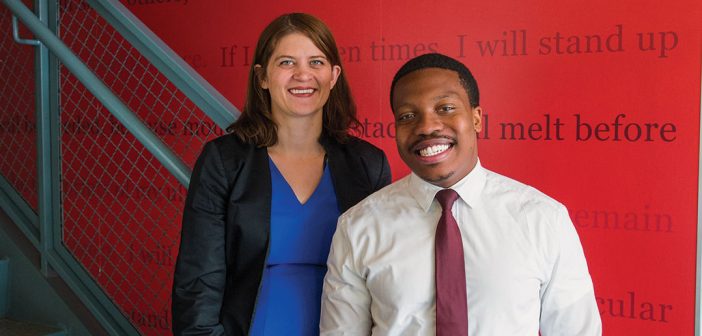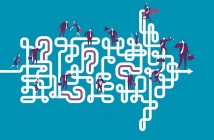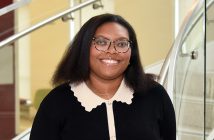Fordham Law students lend a mentoring hand to New York City schoolchildren.
Dimitri Jean ’15 remembers sitting at his desk on the day representatives of Legal Outreach visited his 8th grade public school classroom to give a presentation. A New York City nonprofit organization, Legal Outreach offers students from underserved communities the opportunity to challenge themselves through introductory legal education and debate competition as academic preparation for their pursuit of higher education.
“I felt like I was really offered an opportunity,” Jean recalls of that day. That summer, Jean attended the Summer Law Institute, a full-time program at Legal Outreach, and he remained a student with the organization through his four years in high school. Jean later graduated from Duke University and is now a 3L day student at Fordham Law.
Today, seven years after graduating from the Legal Outreach program, Jean remains actively involved with the organization as a member of Mentoring Youth through Legal Education, Fordham Law’s law student chapter of Legal Outreach. Along with other members of MYLE, Jean serves as a debate coach
training Legal Outreach students for constitutional law debates as part of the organization’s College Bound program.
“It’s pretty surreal, because I remember being a student in the program not too long ago,” said Jean. As a former debater in College Bound, Jean feels fortunate to be able to pass on skills to students going through the same process he went through. “Having won a few debates, including Debater of the Year, when I was a student in the program, I understand the expectations and necessary skills for doing well in the debates,” Jean said.
Jean’s ability to give back to the program that helped him pursue his own college and law school aspirations is typical of the Legal Outreach experience. During its 30-year operation, Legal Outreach has developed a model that is uniquely suited to and successful at transforming the lives of New York City students. One hundred percent of students in the Legal Outreach program graduate high school, while the on-time graduation rate for New York City public schools hovers around 60%. In addition, 99.4% of Legal Outreach College Bound program students have matriculated at four-year colleges; 68% of those matriculate to highly selective colleges such as Harvard, Yale, Columbia, Cornell, Duke, University of Michigan, Smith, and Wesleyan.
“Our goal at Legal Outreach is to help students from underserved communities increase their access to justice and knowledge of the law as well as foster their vision for academic success,” said Grace Pickering ’08, Director of Legal Education at Legal Outreach. “These are the students who are usually the most underrepresented in higher education and certainly in the more selective schools for higher education. It’s important that we try to change that,” she said.
Recognizing the benefits and skills acquired through a legal education, Legal Outreach exposes students to academic challenges and competitions in broad areas of the law. From the 8th through 12th grades, students work after school, on weekends, and during summers in a variety of programs and settings to build the skills and confidence they need to achieve their goals.
Students enter as rising 9th graders to complete the Summer Law Institute, where they learn the fundamentals of the law. After that, students have the opportunity to complete the College Bound program, a four-year law-related academic and college preparatory program consisting of several activities, including writing classes, law internships, SAT preparation, and constitutional law debates.
An essential component of Legal Outreach is the support it receives from the law community, including law students and lawyers who volunteer their time. Fordham Law’s MYLE has been particularly active in this area. Since its genesis, MYLE has encouraged Fordham Law students to join Legal Outreach in its mission, working face-to-face with students in the program.
Members of MYLE serve as debate coaches to Legal Outreach students, who compete in three main debates each year that focus on a constitutional debate topic, such as due process, the Equal Protection clause, freedom of speech, and Miranda rights. The debates are modeled after appellate arguments, and are designed to develop students’ analytic and public speaking skills as well as their substantive knowledge of the law. Recent constitutional law debate topics have included the constitutionality of the Defense of Marriage Act and the application of voter ID laws.
At the end of the year, the top debaters in each grade compete in the Debater of the Year competition while the top two debaters in each grade compete in the Sensational Six competition. Last year’s competitions were held at the Thurgood Marshall United States Courthouse in Manhattan, allowing students to experience law debate in an authentic trial setting.
MYLE was founded in 2011 by Stephanie DiFazio ’13 and Christina Pryor ’13, who wanted to create new opportunities for law students to participate in pro bono community service work. “While several Public Interest Resource Center groups offered Fordham Law students opportunities to work in educational settings with younger, elementary-aged students, we noticed there weren’t as many avenues offering direct involvement with high-school- aged students preparing for higher educational pursuits,” said DiFazio.
DiFazio was a rising 2L when she interned at Legal Outreach, and she believed other Fordham Law students could benefit from the organization’s one-on-one contact with public high school students in the area. She and Pryor pitched the idea for a Fordham Law chapter of Legal Outreach to Hilary Exter of PIRC, and MYLE was born. In its first year alone MYLE drew an impressive turnout—over 30 students volunteered as debate coaches—and that number has grown each year.
Thanks to the committed members of MYLE, Fordham Law students now consistently comprise one of the largest groups of Legal Outreach volunteers among New York City law schools affiliated with Legal Outreach.
Pickering is thrilled with the work MYLE has done. “I’m really proud of how strong MYLE is at Fordham Law. For me it’s really wonderful to be an alumna and see the work Fordham does in continuing public service and giving back to New York City, because these students really are the future of New York City. And the law students benefit by learning to communicate complex legal concepts in a clear manner—as they would with clients.”
MYLE debate coaches meet with their students at least three times before each debate and sometimes serve as judges for competitions. Michael Garza ’15, who is entering his third year as a member of MYLE, said debate coaches provide advice and answer questions, but they are always careful to avoid controlling a student’s process. “All of the work, from briefing the cases to outlining the actual argument, is done by the student. I’m there to support and guide, but I don’t structure the argument. It’s important my student realizes what the best approach is,” said Garza.
Garza has coached the same student throughout his three years with MYLE, beginning when he was a 1L and his student was a sophomore. According to MYLE President Andrea Bonvicino ’15, many coach-student relationships follow this pattern. For Bonvicino, following the progress of the same student each year has allowed the development of a relationship with her student that’s been mutually rewarding.
“My student was originally very uncomfortable with the concept of public speaking,” said Bonvicino. “I was a 1L at the time, and my oral argument fell right around the same time as my student’s third debate. We were able to have a lot of discussions about public speaking, and she even wanted to coach me for my oral argument!” Through MYLE, Bonvicino and her student created a close bond in which they helped each other improve.
Dimitri Jean also coached the same two students until they graduated from the program last year. He said he plans on maintaining a close relationship with them as their friend now that their coach-student relationship has concluded.
According to Jean, the relationship between coach and student gains its strength and value through the students’ losses as well as their victories.
“I think the most rewarding part isn’t necessarily when students win; it’s seeing how well-composed, well-spoken, and knowledgeable about the material they’ve become over the course of their preparation,” he said. “There really is no better feeling than watching them nail a question during the debate that troubled them during debate prep.”
Grace Pickering discussed another student’s transformation through the program. “We had one student who was quiet and struggled with eye contact at the beginning. But since she started working with her coach, she’s become a different student. She makes eye contact; she’s confident. The debate coaches really help bring out all those talents you already knew the students had within them.”
Most MYLE coaches said they’re simply happy to provide opportunities for students who otherwise might lack them. Garza, a Mexican-American first-generation college student, wishes he’d had the support of an organization like Legal Outreach when he was a high school student.
“Many of these students come from backgrounds similar to mine,” explained Garza. “Many of the difficulties I faced in school were due to the fact that I never had anybody around me who’d pursued academic achievement like I wanted to.”
Garza said he feels honored to be able to serve as an example for students.
“I try to show them that just because you don’t have a lawyer or doctor in your family, it doesn’t mean you can’t aspire to those things yourself,” he
said. For the student Garza coaches, those aspirations include attending a top college and becoming a Supreme Court Justice.
Though Jean admits he was always an ambitious student, he said that if it weren’t for Legal Outreach he would not have been nearly as conscious
of the effort that would be required of him in college and law school.
“I personally believe we need mentors in our lives to guide us through the next step we hope to get to,” said Jean. “MYLE allows me to help students who need guidance just like I did.”
In addition to helping high school students, many said MYLE benefits the law students who volunteer as coaches in various ways.
Stephanie DiFazio believes being a member of MYLE taught her how to better manage people. “Initially I was a little too understanding, and
I didn’t give very tough criticism. But I realized that by heightening my own expectations of my students, I could actually encourage them to set their own standards for themselves a little higher as well,” she said.
According to Jean, working as a debate coach offers law students a practical way of engaging with the theories they learn in their first year. “It’s great to feel that you’re putting to use what you’re learning in law school at an earlier stage by being able to help students formulate constitutional law debate arguments,” he said.
MYLE Treasurer Scott Budow ’16 is grateful for the ways MYLE has helped him keep things in perspective.
“As a law student you’re constantly overwhelmed with the stress of your workload,” said Budow. “But working with MYLE, you encounter students who come from very difficult areas with higher crime rates and fewer opportunities, and you start to see your problems differently. You begin to focus more on helping your students with their obstacles, and you realize that if you’re a law student in the first place, your life is not all that bad, no matter what pressures you’re facing.”
Bonvicino said she hopes to make this year’s MYLE more active than ever. Her main goals are to raise group membership among the student body and to increase the sense of community among debate coaches by encouraging a more collaborative teaching environment. “I think our coaches could learn a lot from each other, particularly in the area of helping students improve public speaking skills,” said Bonvicino.
No matter the individual goals of its members, MYLE will continue its mission of helping aspiring college and law students achieve their own educational and professional goals.
“MYLE offers law students the privilege to help usher in the next generation of law students and lawyers and prepare them for success in a way that’s fulfilling for both parties,” said Jean. “It truly is a gift.”
Editor’s note, Jan. 2017: Dimitri Jean is now with K2 Intelligence.




